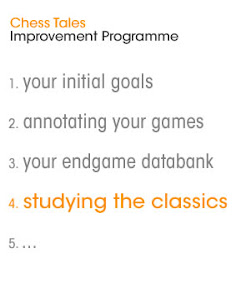 Studying the games from the great players serves many purposes: you will learn more strategic plans; better understand how to recognise and exploit positional strengths and weaknesses; improve your pattern recognition and ability to form suitable plans; and have greater awareness of tactical opportunities.
Studying the games from the great players serves many purposes: you will learn more strategic plans; better understand how to recognise and exploit positional strengths and weaknesses; improve your pattern recognition and ability to form suitable plans; and have greater awareness of tactical opportunities.My advice is to adopt the approach suggested by Dvoretsky (in Secrets of Chess Training
You will need the games available in a format that lets you cover up moves easily, and preferably you will want games that have been well annotated. We'll look at making a set of games available via Chess Tales in a suitable format.
Which games should you study? Dvoretsky and Kotov (in Think Like a Grandmaster
Obviously time will determine how many games you can study, but even just one game per week would see you absorb 52 wonderful games of chess and new ideas by the end of a year.
Studying games like this will also have the side effect of helping you, as Kasparov recommends, to continually broaden and deepen your opening repertoire.

1 comment:
Roger - I wholehartedly agree with this recommendation. I'm currently working through Alekhine's best games (edited by Nunn). But there are a number of books specifically strucutred around the "How good is your chess" format. For strong player the "Chess Combat Simulator", published by New In Chess (I think) is highly recommended.
If you are doing this seriously, then a scoresheet to record moves, pad to capture lines you saw at the board and chess clock are useful..I tend to give myself an hour for the whole game.
The book I mention I particularly like because of the high quality commentary and the commentary comes after the game, not between moves...so you can do the whole game first and only then score-up and look at the analysis.
Post a Comment